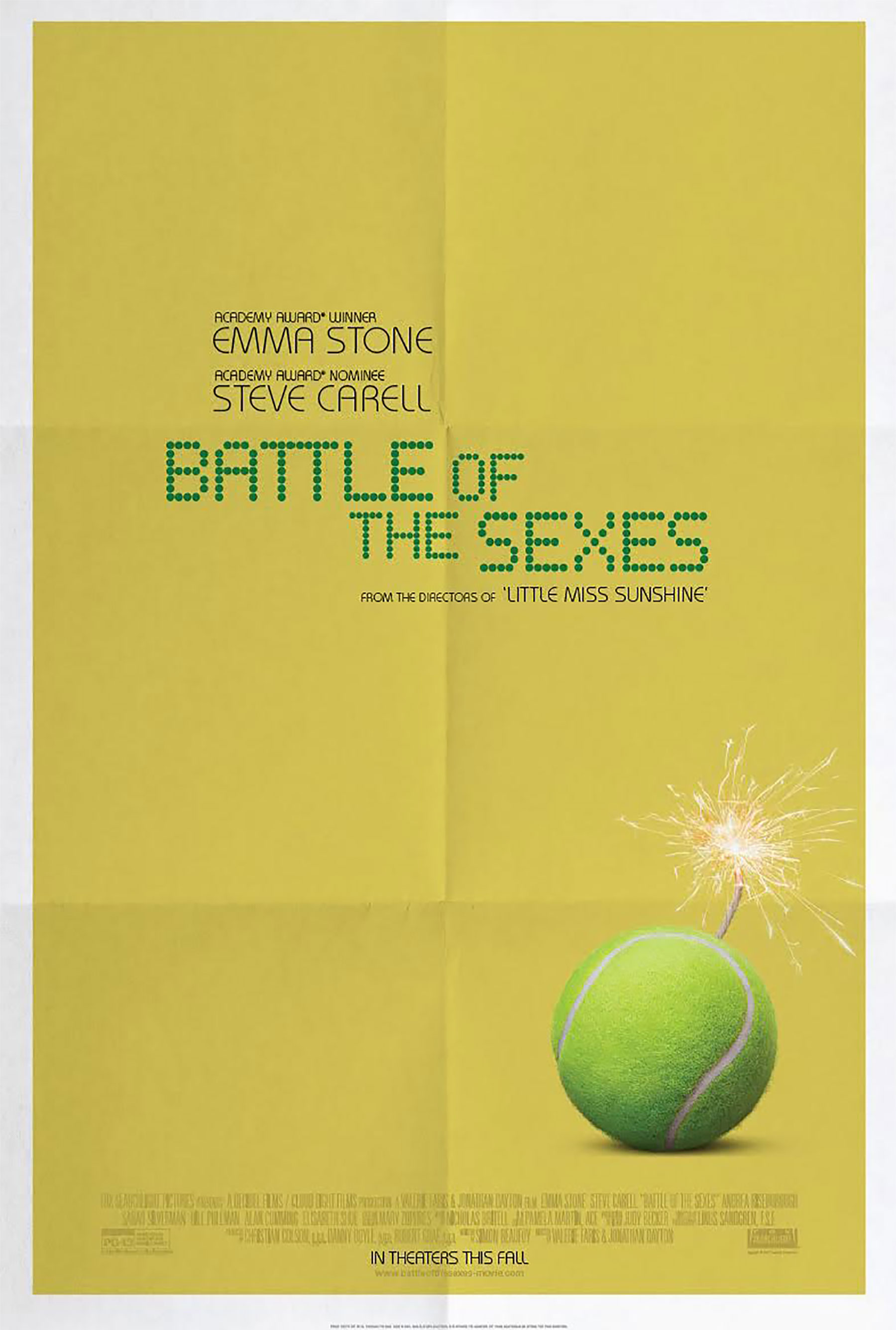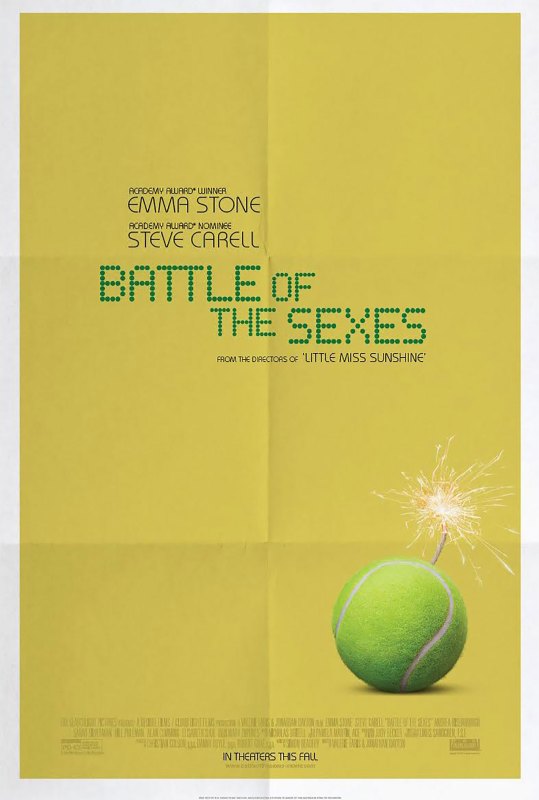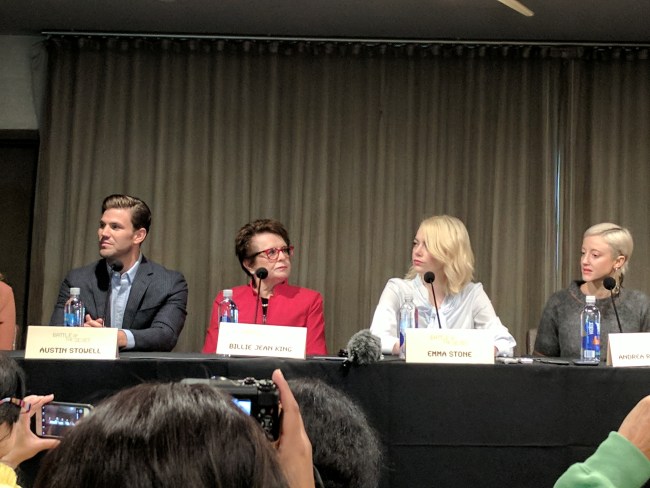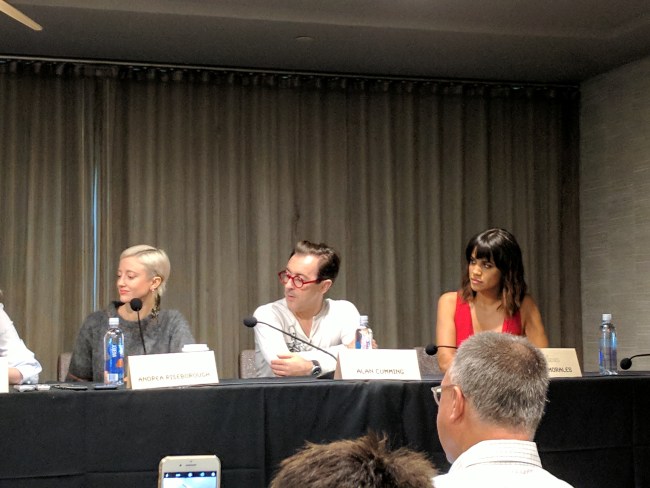Team Billie Jean: Emma Stone and the Battle of the Sexes Cast Pay Tribute to a “Strong, Powerful Woman With a Message”


The highly-anticipated Battle of the Sexes from Fox Searchlight and 21st Century Fox tells the story of the famed “Battle of the Sexes” tennis match in 1973 where Billie Jean King defeated former tennis champ Bobby Riggs for a $100,000 prize. Starring Emma Stone in the role of King, and Steve Carell in the role of Bobby Riggs, the film is as inspiring as the woman upon whose life it’s based.
At a press conference over the weekend promoting the film, Fox Searchlight scheduled two separate conferences: one featuring the members of “Team Billie Jean” (featuring the real-life King herself, alongside Stone, Andrea Riseborough, Alan Cumming, Austin Stowell, Natalie Morales, and Jessica McNamee), the other with “Team Bobby” (Steve Carell, Bill Pullman, Elisabeth Shue, Eric Christian Olsen, directors Valerie Faris & Jonathan Dayton, writer of the theme “If I Dare,” Sara Bareilles, and composer Nick Britell).
The film not only covers the famed match, but the events leading up to it, which includes the founding of the Virginia Slims Circuit, a professional women’s tennis tour founded by King and eight other female tennis pros who left the United States Lawn Tennis Association due to a steep (and sexist) pay inequity.
I don’t “sport,” and I know very little about tennis, but sitting in the Team Billie Jean session listening to Billie Jean King speak, I realized that her greatness lies not just in her tennis ability, but in her humanity and her activism. At 73-years-old, King remains a powerhouse who thankfully now, unlike when she was first playing in the 1970s, can be open about who she is and whom she loves. In fact, her partner, fellow former tennis pro Ilana Kloss was in attendance! She continues to support women in sports through her Women’s Sports Foundation, as well as helps others through her involvement with her good friend Elton John’s AIDS Foundation.
When Emma Stone was asked how she decided what her process would be to portray such a monumental figure from the sports world to whom she had a lot of access, Stone replied:
“I don’t think it was really a decision so much as I had never really played a real person before, much less someone like Billie Jean. And so I wasn’t sure what my process was going to need to be. So, when I met her, she was so wonderful and so welcoming to me, and Billie Jean made it clear from the beginning that she was open to whatever process we needed to go through in order to bring this whole thing to fruition. So we threw some balls around on the tennis court, and I quickly realized that I wanted to watch a lot of footage of her from the time period, and read a lot about her then, because she’s so fully-formed now, and is able to talk about all of this with closure and hindsight, and can see it more clearly than she might have been able to at age twenty-nine. So, I ended up doing a lot of research on her in that specific time frame.”
Alan Cumming, who plays Ted Tinling, an English tennis player/fashion designer who accompanies the Original Nine on their first circuit and becomes a confidante to King feigned indignance at the conference moderator calling his character “one of the girls,” (Cumming: “How dare you!”), but then talked about loving his time on set, because “It’s actually unusual to be surrounded by so many women on a film set. I liked it.”

Austin Stowell plays King’s then-husband, Larry King (not the news dude, the tennis one), who supports his wife’s mission to make tennis better for women, even as he discovers in a not-so-great way that his wife is a closeted lesbian. When talking about his approach to the role of Larry, Stowell said:
“The way I approached it from the very beginning was love. This was somebody that…Larry saw Billy Jean as a strong, powerful woman with a message, with a statement she wanted to get out into the world. And he was willing to sacrifice himself to allow her to deliver that message to the world and give her all the tools she needed to do so. At the end of the day, I think it was a relationship built on selflessness, and it was about the message, the message was more important than the marriage.”
King herself agreed, and said, “Larry and I always talked about changing the tennis world, from the sixties. Actually, it was at Cal State L.A. library where we first started talking about how we wanted to change tennis. So he and I were very much in it together, which really showed how he stayed connected.”
She then brings up a small moment in the film that was nonetheless hugely meaningful to her. In the film, when King approaches the president of the USLTA, Jack Kramer (Bill Pullman), for a raise in pay for female players, there’s a folder of papers on the table. Those papers, in real life, were papers drawn up by Larry, who in addition to being a tennis player was also a lawyer. He drew up all the necessary paperwork required for the women to start their own tour ahead of time, so that if King’s meeting with Kramer went badly (it did), there would be nothing stopping them from striking out on their own.
Despite the issues surrounding her sexuality and their romantic relationship, King reaffirms, “we were very much in it together.”

One member of the Original Nine was dealing with racism as well as sexism at the time. Rosie Casals, who was also King’s doubles partner, is a small woman of El Salvadorean descent who was invited to be one of the commentators during the “Battle of the Sexes” match. The other? Sports Commentary legend, Howard Cosell. The uncomfortably sexist tone of the appearance is cringe-inducing.
Natalie Morales, who plays Casals in the film, was inserted into the footage with Cosell through the magic of visual effects. For most of the commentary, it seems, Cosell has his hand around Casals’ neck. Morales explains:
“Well the original footage is exactly that. He is somehow choking Rosie from the back. And we always think of Howard Cosell as this famed commentator, but it was really with Mohammed Ali that he got his thing, he never really did tennis. So, Rosie is this Grand Slam champion. Like, one of the most winning tennis players of all time, very qualified to commentate on this match, and he introduces her like Hey! It’s Little Rosie Casals! And he basically grabs her by the neck. It’s very telling of the times.”
Cut to 2017 as Sloane Stephens won her first Grand Slam singles title at the U.S. Open, winning a cool $3.7 million. The press conference moderator commented that he loved the expression on Stephens’ face when he watched her winning moment as she was being handed the check, and he asked the group how it felt to see a moment like that, after working on this film portraying King’s fight to get female tennis players more money.
Stone chimed in:
“I was at the U.S. Open with Billie Jean King watching that moment, so it was pretty unbelievable, And Billie Jean said that this is what she and the original nine were fighting for, so how incredible it is…that this is what they were fighting for. They were fighting for the next generation and onward to have moments like that. So, I can only imagine what it must be like for Billie Jean to watch this young girl be presented with $3.7 million. It’s gotta be incredible.”
And King brought up the issue of race as she continued, saying:
“It was. And also, she’s a woman of color. That’s one of the things we were trying to do as well. If you notice, in the Battle of the Sexes, how white everything really is. I think we had two people of color in the audience. Thank God Rosie was the announcer, or we would’ve been in big trouble. But we had Jim Brown, the NFL football player, and we also had George Foreman, the famous boxer.”
Toward the end of the Team Billie Jean session, a question was raised about one of the most poignant, yet quiet moments in the film. After the Billie Jean of the film wins against Bobby Riggs, there’s a moment where she’s sitting in the locker room alone and weeps, allowing all of the pressure of the past several weeks, from her marriage, from her discovery and acknowledgement of her sexuality, from her career, and from her now being seen as a role model to women everywhere to finally come out in a way she hadn’t allowed before.
As she sat at the conference, King got quiet, then said, “I thought Emma portrayed it absolutely, one hundred-percent right. I did not have that opportunity, but that’s exactly how I felt. She captured it better than I could’ve even…it was so touching. So…authentic with what was in my heart at the time.”
So, it seems, this film not only has the blessing of the woman it’s portraying, but even gets the things that are invented for the sake of dramatization very, very right.
Tomorrow, I’ll be bringing you coverage of the Team Bobby session. Meanwhile, Battle of the Sexes arrives in theaters FRIDAY.
(image: Paramount/Teresa Jusino)
Want more stories like this? Become a subscriber and support the site!
—The Mary Sue has a strict comment policy that forbids, but is not limited to, personal insults toward anyone, hate speech, and trolling.—
Have a tip we should know? [email protected]